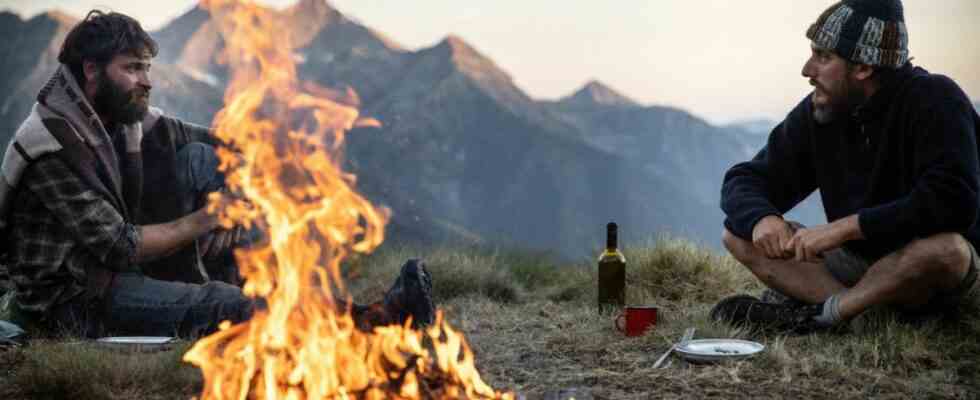Friendship can become home. Eleven-year-olds Pietro and Bruno are as surprised as they are excited when they meet in the small northern Italian mountain village of Grana in the early 1980s. Both are only children and used to doing things alone, as the adult Pietro reports in retrospect: “I never thought I would find a friend like Bruno.” You can see the two boys roaming through summery alpine meadows and jumping into a clear mountain lake, cheering. Bruno ahead because he lives here. But from then on, the city child Pietro spends the summer holidays with him in the mountains. The time in between blurs, because the boys are inseparable.
The intimacy of this friendship needs few words, at least in the here and now of the sun-drenched months the children spend together. Pietro’s subsequent reports have a literary effect in their sparse poetry, they come from a novel: Belgian filmmaker Felix Van Groeningen adapts Paolo Cognetti’s autobiographically inspired coming-of-age novel “Acht Berge”, which was released in 2016 both in his native Italy and internationally was a bestseller. For the first time, Van Groeningen is also working behind the camera with actress Charlotte Vandermeersch. The two won the Jury Prize at last year’s Cannes Film Festival.
Belgian townsfolk are filming an Italian mountain romance – at first that sounds like an almost random constellation. However, “Eight Mountains” finds brilliant images for the novel without becoming too literal and thus flat. He is more carefree than Van Groeningen’s previous films such as “Broken Circle Beakdown” (2012) or the drug drama “Beautiful Boy” (2018). They clung even more to their literary sources and threatened to suffocate under the social dramas they told. Here, for Van Groeningen and Vandermeersch, the plot is just an anchor to which they attach several narrative levels. It is true that children grow into men and a friendship survives times of radio silence. But at the same time, oversized father figures play a role, as does climate change and globalization, which affect the work of mountain farmers.
“I’m the last child in the village,” says eleven-year-old Pietro
With these sidelines, “Eight Mountains” reflects a dilemma not only in the northern Italian Alps: townspeople like Pietro’s family glorify mountain life as a left-wing utopia of life in harmony with nature. Bruno, on the other hand, experiences the rural exodus firsthand: “I’m the last child in the village,” he tells Pietro’s mother when they first meet. It is also clear to him that there will be no more children, because with him there are only 14 residents left. The school has been closed for a long time, the educational opportunities here are zero. His father is a bricklayer in the city, his uncle can hardly make a living from the small alpine farm himself.
They are both grown up when Pietro brings friends from Turin who dream of a life as dropouts. Bruno openly scoffs that the romantic notion of mountain life only lasts until it rains or winter sets in. Van Groeningen’s longtime cinematographer Ruben Impens also visually corrects transfigured postcard panoramas by photographing the film in an almost square format. There is hardly a mountain ridge or a glacier that wants to fit properly into its image sections. Locals like Bruno’s uncle simply don’t have the time to broaden their view or even climb one of the peaks for the fun of it.
A break between Pietro and his father also affects the friendship with Bruno. It will be twenty years before Pietro returns to Grana. He becomes a documentary filmmaker and writer, but no matter what part of the world he is in, he is always drawn to the mountains. In the Himalayas he hears the myth of the world mountain Meru. Surrounded by eight mountains and seas, it is considered the center of the universe. “I’m the one who lives on Mount Meru,” says Bruno when Pietro tells him the story later, “you traveled the eight mountains.” They cannot say whether one of the two made the better decision. Doubts like these echo through their friendship.
Alessandro Borghi and Luca Marinelli play Bruno and Pietro fervently and at the right time timidly as adults. In this way they can leave room for ambivalence and inner turmoil for both characters. Even if they don’t know if they chose the wrong life, their friendship grounds them without words when in doubt. After two decades of radio silence, the two face each other in the mountain village and look at each other uncertainly. “Nice beard,” Bruno finally nods appreciatively. “Yours is prettier,” says Pietro.
Lo otto montagne, Belgium, F, IT, 2023 – Direction and script: Felix Van Groeningen and Charlotte Vandermeersch based on the novel by Paolo Cognetti. Camera: Ruben Impens. Music: Daniel Norgren. With Luca Marinelli, Alessandro Borghi. DCM, 147 minutes. Theatrical release: 01/12/2023.

